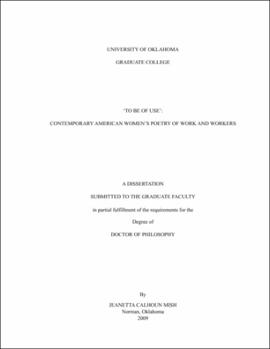| dc.contributor.advisor | Sawaya, Francesca | |
| dc.creator | Mish, Jeanetta Calhoun | |
| dc.date.accessioned | 2019-04-27T21:36:08Z | |
| dc.date.available | 2019-04-27T21:36:08Z | |
| dc.date.issued | 2009 | |
| dc.identifier | 99331107802042 | |
| dc.identifier.uri | https://hdl.handle.net/11244/319119 | |
| dc.description.abstract | In this dissertation, I examine three genres of contemporary women's poetry of work and workers: the historical long poem, the lyric poem, and the hybrid lyric-narrative; identify the poetic devices and imagery which are designed to generate an empathetic response; explain how the poems use empathetic response to engage readers in ethical contemplation; then explore the implicit and explicit ethical demands made in the poetry. This study of the poetics of empathy and ethics in contemporary American women's poetry of work and workers is unique, on the one hand, in its grouping of writers, its emphasis on poetics, prosody, and formal structure rather than on theme, authenticity of representation, or authorial biography, and, on the other hand, in its intersection with aesthetics, and its critical appropriation of certain ideas from ethical literary criticism and from sociological, psychological, and cognitive studies of empathy. Additionally, this study's concern with ethics places it within a growing body of contemporary scholarship on literature and ethics. | |
| dc.description.abstract | The chapters of the dissertation are organized around categories of poetic genre: the long poem, the lyric poem, and the hybrid lyric narrative. In chapter two, I analyze how poems channel empathetic response toward ethical ends in historical long poems by Muriel Rukeyser, Chris Llewellyn, and Diane Gilliam Fisher. In chapter three, I analyze two modes of the ethical lyric, the family poem and the protean narrator poem, in work by Marge Piercy, Maggie Anderson, and Dorianne Laux. In chapter four, I explore how June Jordan and Lorna Dee Cervantes use a hybrid lyric-narrative form to create a dialectical poetic space within which the relationships between the individual and the world, the self and the other, the private and the public, are subject to an ethical interrogation. The conclusion opens with a short meditation on two recurring themes in women's poetry of work and workers followed by a survey of the cultural work poetry does in working-class communities. In section one of chapter five, I offer a selection of women's poetry that operates explicitly to hail other members of the working class, using empathy to create solidarity rather than to serve a class-crossing epistemological purpose. In the second section of the chapter, I explore how poets put their poetries to work on behalf of working-class and underclass communities. Section three of the conclusion offers a survey of small presses and little magazines currently publishing working-class writing. | |
| dc.format.extent | 292 pages | |
| dc.format.medium | application.pdf | |
| dc.language | en_US | |
| dc.relation.requires | Adobe Acrobat Reader | |
| dc.subject | Women and literature--United States--History--20th century | |
| dc.subject | American literature--Women authors--United States | |
| dc.subject | American poetry--Women authors--History and criticism | |
| dc.subject | Work in literature | |
| dc.subject | Working class in literature | |
| dc.title | `To Be Of Use': Contemporary American Women's Poetry of Work and Workers | |
| dc.type | text | |
| dc.type | document | |
| dc.thesis.degree | Ph.D. | |
| ou.group | College of Arts and Sciences::Department of English | |
